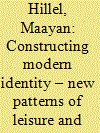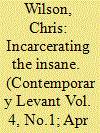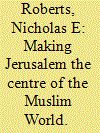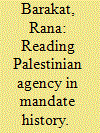|
|
|
Sort Order |
|
|
|
Items / Page
|
|
|
|
|
|
|
| Srl | Item |
| 1 |
ID:
165588


|
|
|
|
|
| Summary/Abstract |
This article explores the cultural transformation that unfolded in urban centres in Palestine during the British Mandate period. Focusing on the city of Haifa as a case study, the article sheds light on how imperial colonial interests prompted massive development of the city that triggered significant cultural changes. The article examines the ways in which different groups in Palestinian-Arab society were involved, and how they initiated, experienced and reacted to the cultural shifts. The rapid increase in the number of cafés, cabarets, bars and restaurants constituted the cornerstone of the commercial entertainment industry in Haifa during this period. By delineating the emergence of new entertainment patterns and recreation habits, the article shows how leisure became a central component in the daily lives of varied social groups. It argues that leisure played a major role as an agent of modernisation and functioned as an essential site for the construction of modern personhoods in Palestinian society.
|
|
|
|
|
|
|
|
|
|
|
|
|
|
|
|
| 2 |
ID:
165583


|
|
|
| 3 |
ID:
165585


|
|
|
|
|
| Summary/Abstract |
Although much has been written about counterinsurgency, policing, and incarceration under the British mandate in Palestine, little work has been done on those who entered the ambit of the carceral system as ‘criminal lunatics’. Criminal lunatics – the term used at the time to specifically designate those found ‘guilty but insane’ by the mandate’s criminal courts, and retained throughout this article both for the sake of analytic clarity and to avoid misdiagnosing individuals by the retrospective imposition of contemporary medical terms – confounded the mandatory government by potentially falling under the responsibility of both its criminal-legal and medical wings. While the focus in the wider scholarship on psychiatry has often been on its expansionist appetites, the struggle over responsibility for criminal lunatics in mandate Palestine offers a case study in the reverse; an attempt to abdicate, not aggrandise, as the health department staved off repeated efforts to make them take responsibility for these cases. This article traces these disputes, and the development of a distinct institutional landscape attendant on their outcome. But the fate of criminal lunatics was not merely determined by debates internal to government; families were important interlocutors too, who variously sought the release of their incarcerated mentally ill relatives, or – more worryingly for the mandate – exploited the criminal-legal system as a back-door to the overcrowded and underfunded government mental institutions. Far from seeing psychiatry as a tool of social control, the government expressed concern about the potential misuse of psychiatric ideas, processes, and institutions by Palestinian families as a way to escape obligations to mentally ill relatives. Foregrounding these fraught contestations brings into focus the sharp limits of the mandate’s ambitions in the sphere of the intimate, and the attempts of some Palestinians to expand those limits for their own ends.
|
|
|
|
|
|
|
|
|
|
|
|
|
|
|
|
| 4 |
ID:
165586


|
|
|
|
|
| Summary/Abstract |
This article investigates the place of Jerusalem in the interwar Pan-Islamic movement through a discussion of the history of how the city came to host the World Islamic Congress of 1931. Arguing against the conventional view that the congress was an unproductive diversion for the Palestinian national movement, it considers how the congress both promoted the Palestinian cause to the wider Muslim world and how it represented Jerusalem’s successful integration into interwar Islamic political networks. The imperial context is also considered at length, not only in terms of the imperial power’s treatment of Pan-Islamism but also in terms of how imperial connections helped the conference’s co-organizers Hajj Amin al-Husayni, the mufti of Jerusalem, and Shawkat ‘Ali, a leading Indian Pan-Islamist connect across national borders.
|
|
|
|
|
|
|
|
|
|
|
|
|
|
|
|
| 5 |
ID:
165584


|
|
|
|
|
| Summary/Abstract |
Posited as ‘post-national’ and articulated as ‘relational,’ recent historiography of the mandate period has had a long-term effect on how we read (and have been warned not to read) nationalism and resistance in Palestine. Beyond a critical survey of a select part of this recent historical literature, this essay shows how the question of nationalism has been framed in only one way and towards one end. Using this critical reading of the historical literature, this essay further attempts to open up space for a means of understanding Indigenous nationalism (and indigenous resistance) outside of the confined space of this particular treatment of nation-state nationalism. I suggest we move towards exploring an indigenous epistemological understanding of ‘history as story telling’ outside of these Zionist ontological constraints.
|
|
|
|
|
|
|
|
|
|
|
|
|
|
|
|
| 6 |
ID:
165587


|
|
|
|
|
| Summary/Abstract |
Tourist guides to colonised territories are usually understood as instruments of the coloniser, imposing ideas of native inferiority through orientalism and convictions of primitiveness. This article, however, shows how Palestinian Arabs and Zionist Jews in the later period of British Mandate rule used guidebooks, written in English and particularly aimed at a readership of Commonwealth soldiers on leave, as a means of asserting and conveying their rival claims to Palestine to popular Anglophone audiences. In particular, they combined the more conventional coverage of historical and religious sites with insistence on the modernity and technological progress to be found amongst their respective cultures and histories. I understand this as both a tactical usage of the concept of modernity to intervene in image-making about the Middle East, and as a conscious effort by Palestinian Arabs and Jews to insist that modern values, associated in the language of the Mandate and notions of progress, were inherent in their cultures and social practices.
|
|
|
|
|
|
|
|
|
|
|
|
|
|
|
|
|
|
|
|
|